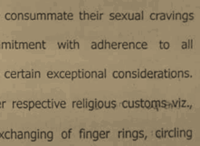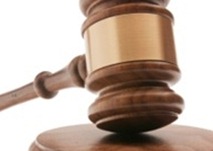The Bench and the Bar
Bar, Bench & Litigation
Deepak Khosla, a petitioner in the Shimla high court, asked for compensation of Rs 1 crore from two sitting judicial officers, police personnel, public prosecutors and McDonalds managing director Vikram Bakshi. Khosla alleged he had been “framed” in baseless criminal proceedings, resulting in substantial injury to his reputation.
The Times of India reported:
“The petitioner in court stated that no mala fides was being alleged against two judges of a district court arrayed by name in the application but alleges ‘implied malice’ resulting from their negligence in diligently perusing the case materials before them in which Khosla is an accused.
[…] taking up the application moved under Section 482 of CrPC, Chief Justice A M Khanwilkar heading the bench with Justice Kuldip Singh after issuing a stern warning to petitioner Deepak Khosla about the nature of the relief sought, (compensation of Rs 1 Cr) said in the open court that in all his career in the bar or as a judge he had not come across any such case where judges were intended to be sued.
Bar, Bench & Litigation
The higher judiciary is revamping the system of appointment of senior advocates, to weed out incompetent advocates and appointment through ‘uncle judges’. In the Delhi high court, the full court will now have to consider the name of each applicant, while in the Supreme Court five sitting judges of the SC will have to agree to the candidature of an advocate.
The Times of India reported:
Some of the advocates who have not been considered by a particular high court for such prestigious position have allegedly used clouts to get the coveted post from high courts of smaller states where the bench is relatively smaller.
SCOI Reports
 Have you heard about the senior advocate who “borrowed” paintings from a five-star suite and then got his client to pay for them?
Have you heard about the senior advocate who “borrowed” paintings from a five-star suite and then got his client to pay for them?
Bar, Bench & Litigation
Gujarat high court chief justice (CJ) Bhaskar Bhattacharya, whose elevation to the Supreme Court was rejected unanimously by the SC collegium, has accused chief justice of India (CJI) Altamas Kabir of bias spurred by Bhattacharya’s opposition of the CJI’s sister’s elevation to the bench, reported the Express.
Bhattacharya was the third senior-most high court (HC) CJ at the time of his rejection. His nomination, alongside that of Bombay HC CJ Mohit Shah and Uttarakhand HC CJ Barin Ghosh, was rejected as proving “counter-productive and not conducive to the administration of justice”.
According to the Express, Bhattacharya wrote in his letter to the CJI:
“As a human being, I have a reasonable basis to apprehend that the fact that as a member of the collegium while I was a judge of the Calcutta HC, I raised serious objections against the elevation of Smt Shukla Kabir Sinha, your (CJI Altamas Kabir's) younger sister, is the real reason for making such observations against me.”
“In my view as an advocate who at the age of 58 years is just capable of earning a net amount of Rs 88,000 from practice should in no case be recommended for judgeship. We cannot lose sight of the fact that a High Court chaprasi gets more than Rs 13,000 per month as salary which is equivalent to Rs 1,56,000 per annum which is almost double the income of Mrs Shukla Kabir Sinha from her practice as a lawyer.”
“When time came for selection of Smt Shukla Kabir Sinha as a Judge of the HC, I was pressured to agree to such a proposal as a member of the collegium, but I thought it would amount to committing rape of the Calcutta HC, which was like my mother and if I didn't raise any objections that would amount to closing my eyes while my mother was being raped.”
Bar, Bench & Litigation
A Supreme Court bench of Justices AK Patnaik and SJ Mukhopadhaya ruled that lawmakers can be disqualified if they have been convicted of a criminal offence.
The bench struck down as ultra vires section 8(4) of the Representation of the People Act (RPA), which protected MPs, MLAs and other legislators in their posts if they had appealed their criminal convictions in a higher court, reported the Indian Express.
The ruling, which will not apply retrospectively to those who have already filed their criminal appeals, was made in petitions filed by Lily Thomas and the NGO Lok Prahari, which challenged a number of RPA provisions as unconstitutional.
According to disclosures made by candidates to the Election Commission, 1,460 MPs and MLAs have criminal cases pending, of which 688 were serious, reported the Express.
Bar, Bench & Litigation
Senior-most Supreme Court justice P Sathasivam was appointed Chief Justice of India-designate on Saturday. He will be sworn in as the Chief Justice of India CJI) on 19 July, a day after current CJI Altamas Kabir’s retirement.
Sathasivam, aged 64, is the first judge from Tamil Nadu to become the CJI, reported the Hindu. He was elevated to the SC on 21 August 2007 while serving as a judge in the Punjab & Haryana high court and had never served as a high court CJ.
He started his career in 1973 after graduating from Government Law College Chennai, as a junior lawyer under Madras high court senior advocate Muthumani Duraisamy, according to the New Indian Express.
“Statistics point that just one per cent of cases from Madras High Court go on appeal to the Supreme Court whereas this figure is 12 per cent for Delhi High Court. We hope this scenario would change and he would do something about it,” Madras HC advocate NL Rajah told NIE.
Sathasivam – the 40th CJI – will retire on 26 April 2014.
Bar, Bench & Litigation
A frustrated walk-out by Kerala high court judge K Vinod Chandran halted court proceedings less than half hour after they had begun on Friday, reported the Hindu.
Chandran had granted 11 pass overs on request from government pleaders when the 12th government pleader also asked for a pass over on the ground that he had not received the case files from the advocate general’s (AG) office. After this request Chandran walked out, according to the report.
He later summoned Advocate General KP Dandapani and Kerala High Court Advocates’ Association president Babu Paul to his chamber and expressed his displeasure at having to defer cases repeatedly, owing to what appeared to be the disinterest of lawyers from the AG’s office. He said lawyers should cooperate to ensure that the courts worked smoothly.
The 12th case of that day had been deferred repeatedly for the last three years. The case is against a cooperative bank whose secretary was impleaded in 2010 and had been asked to file a reply within three months, but none had been filed till date.
Bar, Bench & Litigation
 The DoJ project to computerise 14,249 courts is 85 per cent complete, according to an RTI response.
The DoJ project to computerise 14,249 courts is 85 per cent complete, according to an RTI response.
Bar, Bench & Litigation
 Read the full judgment of the Madras high court, which was the cause of controversy, outrage and humour on social and other media.
Read the full judgment of the Madras high court, which was the cause of controversy, outrage and humour on social and other media.
Bar, Bench & Litigation
Bombay, Karnataka and Andhra Pradesh high and subordinate courts will in real time upload their case pendency statistics and case progress reports online, with litigants slated to have access to some of the data via phone text messages. The deadline for these three states’ courts to implement the upgrade was June 2013, and for all the other HCs it is December 2013, according to a Times of India report citing sources.
This data will be on the National Judicial Data Grid (DJDG) which is part of the eCourts project, and is also supposed to assist in formulating policy to reduce case delays. The implementing agency, the National Informatics Centre, has reportedly provisioned 100 “virtual machines” at its national data centre (NDC) in New Delhi to host the flood of real-time data. Data from 17 district courts has already been uploaded by the HCs with the data centre.
Bar, Bench & Litigation
 The Delhi subordinate judiciary recruited at 18.4 per cent of its actual requirement this year, despite getting the nod of the Delhi government to recruit according to requirement.
The Delhi subordinate judiciary recruited at 18.4 per cent of its actual requirement this year, despite getting the nod of the Delhi government to recruit according to requirement.
Bar, Bench & Litigation
The Bar Council of India’s (BCI) chairman Manan Kumar Mishra and vice chairman Zafar A Khan will prepare a report on the manner in which the BCI and the state bar councils could participate in the appointment process of Supreme Court judges and the chief justices of all high courts. The report is planned to be submitted to the central and state governments.
The BCI is acting on the Madhya Pradesh state bar council’s and high court’s letter written to it, highlighting the concerns of former assistant solicitor general of India Radhe Lal Gupta. Gupta had shot a letter in March to all SC judges and chief justices of all HCs, questioning why some name recommendations to the SC collegium for judicial appointments were not considered positively.
Taking this into account the BCI has resolved to lobby for representation of lawyers’ bodies in the appointment process and has decided to raise this issue at a conference of judges and lawyers expected to be held after the court vacations. [Express]
The collegium system of judicial appointments has been a recent bone of contention between the executive and judiciary.
Bar, Bench & Litigation
Delhi high court now has an acting chief justice in the HC’s senior-most justice BD Ahmed after chief justice D Murugesan retired on 8 June.
An additional judge at the HC justice Mool Chand Garg is now a permanent judge of the court.
The Punjab & Haryana HC’s additional judges, justices Paramjeet Singh, Naresh Kumar Sanghi and Rameshwar Singh Malik were also made permanent in that HC [PTI]